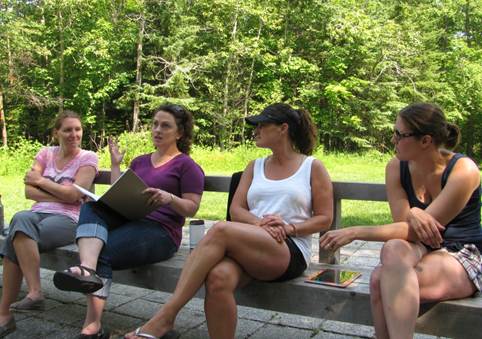- Campuses :
- Twin Cities
- Crookston
- Duluth
- Morris
- Rochester
- Other Locations

center for writing
mwp.umn.edu
Lake Superior Writing Project 2013 Mini-Institute
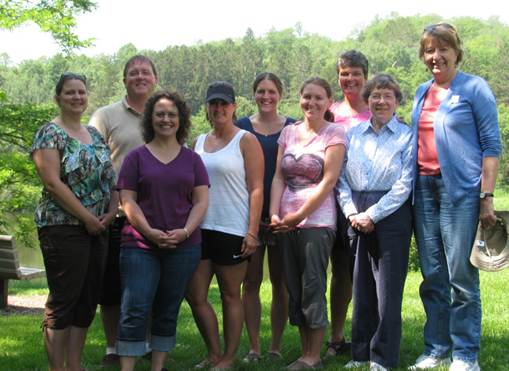 Co-leader Susan Perala-Dewey writes:
Co-leader Susan Perala-Dewey writes:
We welcomed seven regional teachers to join our strong and supportive teacher network here in northeastern Minnesota and northwestern Wisconsin. This year we had two educators from Minnesota’s Iron Range and another UMD alumna from Dover-Eyota Elementary School. We had four teachers from Duluth—a district data coach, a kindergarten teacher, a high school science teacher, and a UMD Communications professor. We also had a special guest part of the week. Jessica Noor, UMD Writing Studies major, decided to make the writing project her research focus for her summer course. Jessica spent at least an hour each day taking part in writing project activities, observing, and interviewing some of our teachers. Her story of four UMD alumni returning to campus to further their learning has been published on UMD’s homepage.
As always, this group of educators took on a unique personality—theirs, from day one, was sharing! In fact, I do not believe we went one day without every person in the group (except perhaps me) sharing their writing. It became their identity and mantra. They even questioned the point of a “final reading” since they had shared everything from every prompt since day one. Perhaps what prompted this group identity was that Jean and I decided to give the participants options on the first day. We laid out the objectives of the mini-institute, contrasted these to the NWP Model, and said, “These are the objectives, this is how we usually proceed, but we would like you all to decide what would best suit your needs.” By the end of the day, this fine, close-knit group had decided they wanted to be a single “writing group” because they did not want to “miss out on anyone else’s writing.” This kind of close, collaborative, and trusting spirit defined our week together.
If we had to state a theme that emerged from our writing, it would have to be “family and ancestry”—those people and places we all seem to gravitate toward, if given a choice. We wrote about grandmas, grandpas, dads, moms, sisters, brothers, cousins, our own kids, and the hard choices we make to move away from our families and even harder decisions to return. We set the rule of confidentiality on day one, and the intimacy of this group wove together seamlessly, like fine, soft folds of Japanese silk. We shared what has been unbearable and unspeakable—we cried together every day.
This group, unlike any previous cohort, decided to present their teaching demonstrations individually. In the past, the LSWP has assigned groups to present a lesson in a best practice in writing. This year we were treated to demonstrations on how to set up a writer’s workshop; tips and techniques for working with young writers; “This I Believe” writing prompt ideas; using a photo gallery to get high school students moving, engaged and thinking; a pre/post assessment activity using writing in the high school science classroom; i-Pad writing apps; and ways to get students thinking about audience and purpose. This group clearly knew they each had a different story to tell.
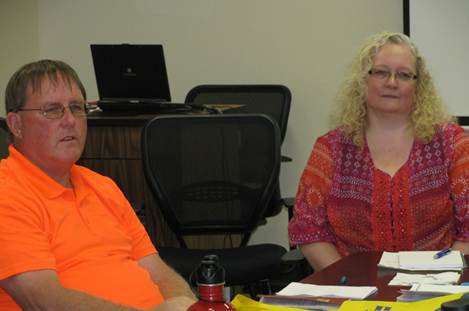 As has been our custom, we invited an exemplar writing project teacher to present a lesson from their classroom on Wednesday afternoon. This year, René Montgomery (LSWP 2010; MWP 2011) came prepared to keep us busy and focused on writing. René introduced us to making “blank books” for student writing. These books serve to record and commemorate student writing throughout the year. René lamented how in the past the district paid for “hard copy” blank books, but that recent budget cuts have made these books prohibitive for teachers to purchase. After folding, creasing, cutting, and inserting pages to make a handy, personalized blank book, René took us into her “writing garden.” She shared ideas from an MWP teacher demonstration about using sets of texts around the theme of community gardens to both inspire writing and break down the writing process. René explained how she prompts her students to think about stories or ideas as a watermelon—some ideas are big (the whole watermelon), others are slices (stories that are part of the whole), and still others are tiny seeds (in-depth looks at moments that can be detailed as a story). We used our new “blank books” to brainstorm, draft, and share stories of our own life garden.
As has been our custom, we invited an exemplar writing project teacher to present a lesson from their classroom on Wednesday afternoon. This year, René Montgomery (LSWP 2010; MWP 2011) came prepared to keep us busy and focused on writing. René introduced us to making “blank books” for student writing. These books serve to record and commemorate student writing throughout the year. René lamented how in the past the district paid for “hard copy” blank books, but that recent budget cuts have made these books prohibitive for teachers to purchase. After folding, creasing, cutting, and inserting pages to make a handy, personalized blank book, René took us into her “writing garden.” She shared ideas from an MWP teacher demonstration about using sets of texts around the theme of community gardens to both inspire writing and break down the writing process. René explained how she prompts her students to think about stories or ideas as a watermelon—some ideas are big (the whole watermelon), others are slices (stories that are part of the whole), and still others are tiny seeds (in-depth looks at moments that can be detailed as a story). We used our new “blank books” to brainstorm, draft, and share stories of our own life garden.
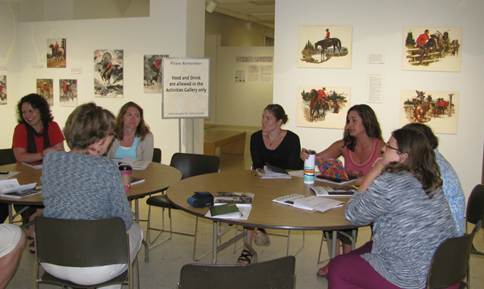
We also took time for a field trip and educational experience at UMD’s Tweed Museum of Art. Susan Hudec (LSWP 2012) and the Tweed Museum’s Art Educator met us with writing ideas in hand. Teachers took time to explore the museum with five prompts educators can use with students to explore different works of art and apply them to their own perspective and interpretation. Afterwards, we debriefed while teachers shared their writing (every one of us!) and discussed ideas for their own classroom. Susan was glad to receive some feedback about “postcard print” ideas she is considering for K-12 classroom art activity materials.
Following tradition, we ended our week with a final reading at Bagley Outdoor Classroom, where we enjoyed more stories, laughter, and tears.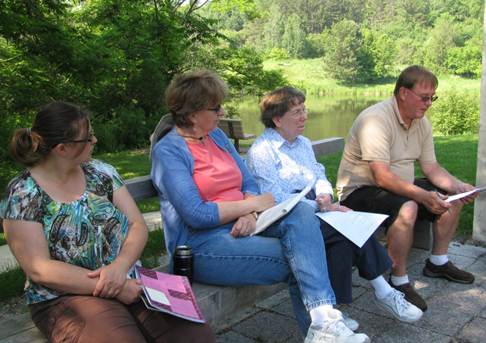
After our salad bar potluck, we enjoyed one final writing activity before parting. Using Georgia Heard’s final chapter on reflection, we wrote about what we need to sustain ourselves as writers as we move forward. Each of us made a list and we read the entries aloud, one-by-one, until there was only silence remaining. This group of talented teachers and writers, it seems, did not want this writing project week to end. We will be making plans for an early March 2014 Reunion.